 W
WColonel Robert Berkeley Airey, was an English cricketer and British Army officer. He was a right-handed batsman who played first-class cricket for Hampshire during the 1911 season. He was born in Southminster and died in Westminster Pier.
 W
WGeneral Sir David Baird, 1st Baronet, GCB was a British Army officer.
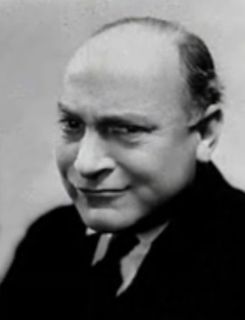 W
WEric Blore Sr. was an English actor and writer. His early stage career, mostly in the West End of London, centred on revue and musical comedy, but also included straight plays. He wrote sketches for and appeared in variety. In the 1930s Blore acted mostly in Broadway productions. He made his last London appearance in 1933 in the Fred Astaire hit Gay Divorce. Between 1930 and 1955 he made more than 60 Hollywood films, becoming particularly well known for playing butlers and other superior domestic servants. He retired in 1956 for health reasons, and died in Hollywood in 1959 at the age of 71.
 W
WLieutenant-Colonel Frank Edward Bourne OBE DCM was a decorated British soldier who participated in the defence of Rorke's Drift during the 1879 Anglo-Zulu War.
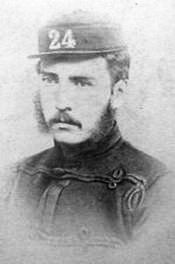 W
WMajor Gonville Bromhead VC was a British Army officer and recipient of the Victoria Cross, the highest award for valour in the face of the enemy that can be awarded to members of the British armed forces. He received the medal for his part in the defence of Rorke's Drift in January 1879, in which a small British garrison of 139 soldiers successfully repulsed an assault by some 4,000 Zulu warriors. Bromhead was portrayed by Michael Caine in the film Zulu, which depicted the battle.
 W
WAngus Buchanan, was an English recipient of the Victoria Cross, the highest and most prestigious award for gallantry in the face of the enemy that can be awarded to British and Commonwealth forces.
 W
WLieutenant Colonel Daniel Burges, VC, DSO was an English recipient of the Victoria Cross, the highest and most prestigious award for gallantry in the face of the enemy that can be awarded to British and Commonwealth forces.
 W
WAlun Arthur Gwynne Jones, Baron Chalfont, was a British Army officer, a British politician and a historian.
 W
WMajor General Ralph Arthur Penrhyn Clements,, commonly known as R. A. P. Clements, was a senior British Army officer.
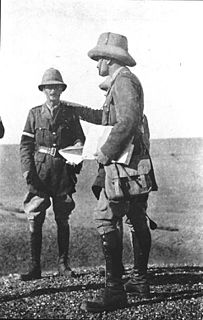 W
WGeneral Sir Alexander Stanhope Cobbe was a senior British Indian Army officer and a recipient of the Victoria Cross, the highest award for gallantry in the face of the enemy that can be awarded to British and Commonwealth forces.
 W
WAmbrose Coghill was an Anglo-Irish actor and aristocrat, being the 7th baronet Coghill (1981–1983).
 W
WNevill Josiah Aylmer Coghill VC was an Irish recipient of the Victoria Cross, the highest and most prestigious award for gallantry in the face of the enemy that can be awarded to British and Commonwealth forces.
 W
WEdward Cornwallis was a British career military officer and was a member of the aristocratic Cornwallis family, who reached the rank of Lieutenant General. After Cornwallis fought in Scotland, putting down the Jacobite rebellion of 1745, he was appointed Groom of the Chamber for King George II. He was then made Governor of Nova Scotia (1749–1752), one of the colonies in North America, and assigned to establish the new town of Halifax, Nova Scotia. Later Cornwallis returned to London, where he was elected as MP for Westminster and married the niece of Robert Walpole, Great Britain's first Prime Minister. Cornwallis was next appointed as Governor of Gibraltar.
 W
WArthur Reginald French, 5th Baron de Freyne was Anglo-Irish military officer of the British Army who had also served in the ranks in the United States Army.
 W
WCampbell Mellis Douglas, was a Canadian recipient of the Victoria Cross, the highest and most prestigious award for gallantry in the face of the enemy that can be awarded to British and Commonwealth forces. The awarding of the VC to Douglas was one of the few instances of the VC being awarded for actions taken not in the face of the enemy.
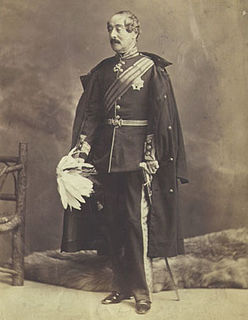 W
WSir Charles Hastings Doyle, was a British military officer and he was the second Lieutenant Governor of Nova Scotia post Confederation and the first Lieutenant Governor of New Brunswick.
 W
WGeneral Sir Charles Henry Ellice was a former Adjutant-General to the Forces.
 W
WColonel Richard Davies Garnons Williams was a British Army officer and Welsh rugby union player who represented Wales, Brecon and Newport. He played in the first Wales international rugby union match in 1881.
 W
WMajor Edric Frederick Gifford, 3rd Baron Gifford, VC was an English recipient of the Victoria Cross, the highest and most prestigious award for gallantry in the face of the enemy that can be awarded to British and Commonwealth forces.
 W
WGeneral Sir Alfred Reade Godwin-Austen was a British Army officer who served during World War I and World War II.
 W
WMajor General Dudley Graham Johnson, was a British Army officer and recipient of the Victoria Cross, the highest award for gallantry in the face of the enemy that can be awarded to British and Commonwealth forces.
 W
WAlun Lewis was a Welsh poet. He is one of the best-known English-language poets of the Second World War.
 W
WSaunders Lewis was a Welsh political activist, poet, dramatist, historian and literary critic. He was a prominent Welsh nationalist and one of the founders of Plaid Genedlaethol Cymru, later known as Plaid Cymru. Lewis is usually acknowledged as one of the most prominent figures of 20th century Welsh-language literature. In 1970, Lewis was nominated for a Nobel Prize in Literature. Lewis was voted the tenth greatest Welsh hero in the '100 Welsh Heroes' poll, released on St. David's Day 2004.
 W
WGeneral William Henry Kerr, 4th Marquess of Lothian was a Scottish nobleman, British soldier and politician, the eldest son of William Kerr, 3rd Marquess of Lothian. He was styled Master of Jedburgh until 1722, Lord Jedburgh from 1722 to 1735, and Earl of Ancram from 1735 to 1767. As the Earl of Ancram, he distinguished himself during the War of the Austrian Succession.
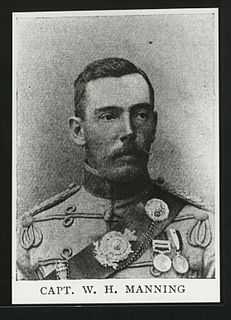 W
WBrigadier-General Sir William Henry Manning, was a British Indian Army officer and colonial administrator.
 W
WGeneral John Churchill, 1st Duke of Marlborough, 1st Prince of Mindelheim, 1st Count of Nellenburg, Prince of the Holy Roman Empire, was an English soldier and statesman whose career spanned the reigns of five monarchs. From a gentry family, he served first as a page at the court of the House of Stuart under James, Duke of York, through the 1670s and early 1680s, earning military and political advancement through his courage and diplomatic skill.
 W
WTeignmouth Melvill VC was an English recipient of the Victoria Cross, the highest and most prestigious award for gallantry in the face of the enemy that can be awarded to British and Commonwealth forces.
 W
WHenry Ludwig Mond, 2nd Baron Melchett was a British politician, industrialist and financier.
 W
WColonel Frederick Courtenay Morgan was a Welsh Army officer and Conservative politician.
 W
WBrigadier John Pennycuick CB, KH was an officer in the British Army who served in Java, Burma, Aden, Afghanistan, Pakistan, and India. He was born in Soilzarie in Perthshire and was killed at the Battle of Chillianwalla in the Second Anglo-Sikh War.
 W
WColonel Sir Anthony Coningham Sterling KCB was a British Army officer and historian, author of The Highland Brigade in the Crimea.
 W
WMajor-General Sir William Penn Symons KCB was a British Army officer who was mortally wounded as he commanded his forces at the Battle of Talana Hill during the Second Boer War. While his forces won the battle, they had to abandon their position and fall back to Ladysmith. Symons and the more severely wounded were left to the Boers; he died three days later as a prisoner of war. A monument to his valour was raised in Victoria Park, Saltash, Cornwall, UK.
 W
WWilliam Tatton (1659–1736) was a career soldier in the British Army who rose to the rank of Lieutenant-General.